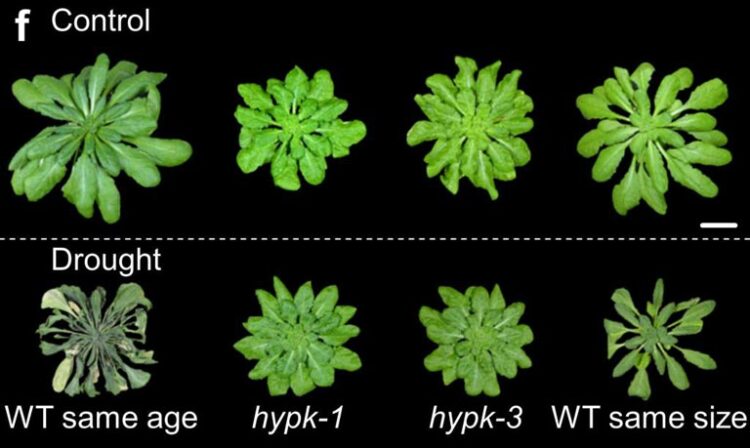Building Block for a Longer Life

Representative phenotype of well-supplied (Control) and drought-stressed wild type (WT) plants and HYPK mutants. The drought stress was applied to approx. five-week-old plants for 24 days. Scale bar = 2 cm. | © Miklánková et al., Sci. Adv. 8, eabn6153 (2022), CC BY-NC 4.0
Heidelberg plant researchers identify key protein in a mechanism that controls the life of proteins.
Proteins are existential building blocks of life that also have numerous functions in plants. An average plant cell contains more than 20 billion protein molecules that maintain cellular metabolism and stabilise their structure. Researchers at the Centre for Organismal Studies of Heidelberg University recently shed light on a cellular mechanism that extends the life of plant proteins. They have now identified a key protein that regulates this mechanism, which is known as N-terminal acetylation.
N-terminal acetylation is a chemical label that appears when proteins are manufactured. To do this, plants attach an acetic acid residue at the beginning of the protein. This acetic acid residue protects the majority of proteins from breakdown by the so-called proteasome, which acts likes a type of molecular shredder. According to the Heidelberg researchers under the direction of Prof. Dr Rüdiger Hell and Dr Markus Wirtz, the now identified key protein is known as the Huntingtin Yeast Interactor Protein K (HYPK). It promotes N-terminal acetylation, thereby prolonging the life of plant proteins, which among other things is important for adjusting to environmental conditions.
To study the regulatory functions of the HYPK protein, the Heidelberg team used thale cress (Arabidopsis thaliana). The plant from the Brassicaceae family is a preferred model organism owing to its well-researched genome. Research on genetically altered plants has shown that the life of proteins is reduced when the HYPK protein is absent and N-terminal acetylation does not take place. At the same time, the plant’s resistance to ongoing drought rises. Rüdiger Hell: “Our current research is directed to finding out how this improved drought resistance comes about.”
In cooperation with researchers from the Chinese Academy of Sciences in Beijing (China) under the direction of Prof. Dr Yonghong Wang, the Heidelberg scientists also discovered that HYPK performs its regulatory function not only in thale cress but also in rice, one of the world’s oldest crops. The protein is also found in humans and in many fungi. “The mechanism involved in acetylation and its control by HYPK appears to be one that developed billions of years ago and has been retained in very different organisms to this day,” explains Markus Wirtz.
The basic research on protein acetylation in Heidelberg is being funded by the German Research Foundation. The results of the current research were published in the journals “Science Advances” and “Molecular Plant”.
Contact:
Heidelberg University
Communications and Marketing
Press Office, phone +49 6221 54-2311
presse@rektorat.uni-heidelberg.de
Wissenschaftliche Ansprechpartner:
Dr Markus Wirtz
Centre for Organismal Studies
Tel. +49 6221 54-5334
markus.wirtz@cos.uni-heidelberg.de
Prof. Dr Rüdiger Hell
Centre for Organismal Studies
Tel. +49 6221 54-6284
ruediger.hell@cos.uni-heidelberg.de
Originalpublikation:
P. Miklánková et al.: HYPK promotes the activity of the Nα-acetyltransferase A complex to determine proteostasis of nonAc-X2/N-degron-containing proteins. Science Advances (15 June 2022), DOI: 10.1126/sciadv.abn6153
X. Gong et al.: OsHYPK-mediated protein N-terminal acetylation coordinates plant development and abiotic stress responses in rice. Molecular Plant (4 April 2022), https://doi.org/10.1016/j.molp.2022.03.001
Weitere Informationen:
http://www.cos.uni-heidelberg.de/en/research-groups/molecular-biology-of-plants/… – Markus Wirtz working group
http://www.cos.uni-heidelberg.de/de/forschungsgruppen/molekulare-biologie-der-pf… – Rüdiger Hell working group
http://www.uni-heidelberg.de/en/newsroom/protection-from-the-molecular-shredder – Press release “Protection from the Molecular Shredder”
Media Contact
All latest news from the category: Life Sciences and Chemistry
Articles and reports from the Life Sciences and chemistry area deal with applied and basic research into modern biology, chemistry and human medicine.
Valuable information can be found on a range of life sciences fields including bacteriology, biochemistry, bionics, bioinformatics, biophysics, biotechnology, genetics, geobotany, human biology, marine biology, microbiology, molecular biology, cellular biology, zoology, bioinorganic chemistry, microchemistry and environmental chemistry.
Newest articles

Innovative 3D printed scaffolds offer new hope for bone healing
Researchers at the Institute for Bioengineering of Catalonia have developed novel 3D printed PLA-CaP scaffolds that promote blood vessel formation, ensuring better healing and regeneration of bone tissue. Bone is…

The surprising role of gut infection in Alzheimer’s disease
ASU- and Banner Alzheimer’s Institute-led study implicates link between a common virus and the disease, which travels from the gut to the brain and may be a target for antiviral…

Molecular gardening: New enzymes discovered for protein modification pruning
How deubiquitinases USP53 and USP54 cleave long polyubiquitin chains and how the former is linked to liver disease in children. Deubiquitinases (DUBs) are enzymes used by cells to trim protein…



